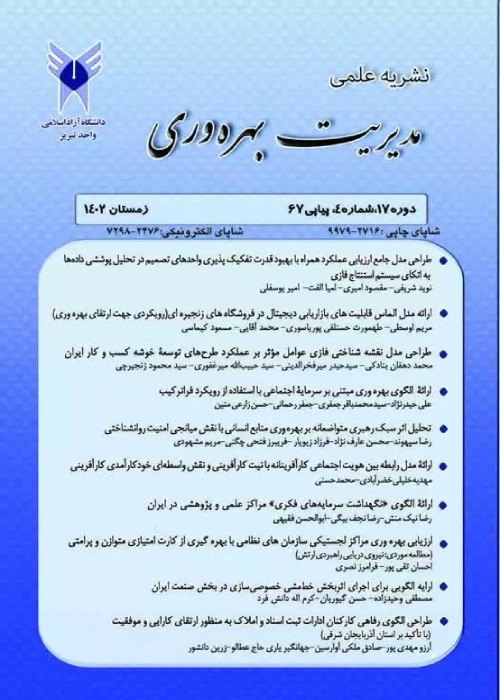A Model for Explaining the Role of Shared Leadership in the Productivity of Knowledge-based Companies
Author(s):
Article Type:
Research/Original Article (دارای رتبه معتبر)
Abstract:
The knowledge-based economy and the widespread emergence of knowledge-based companies as well as the creation of knowledge-based values and the importance of the knowledge worker in organizations have attracted the governments’ attention which in turn has lead to new styles of leadership and management be tailored to the specific conditions of these companies. In the leadership literature, corresponding to the knowledge worker who wants a degree of independence and works in environments with high complexity and task interdependence, shared leadership has been suggested as a predictor of enhancing individual performance, team effectiveness and increasing productivity in organizations. Hence, the present study was conducted to investigate the consequences of shared leadership in knowledge-based companies and to determine the variables affecting the implementation of this leadership style in knowledge-based companies. This descriptive research was developmental and applied in terms of purpose and had an exploratory mixed method design. The statistical population of the study consisted of the managers and employees of knowledge-based companies in the field of information and communication technology. In the qualitative part, sampling was performed in a purposeful and judgmental manner and the sample size was determined based on theoretical saturation. In the quantitative part, sampling was done through convenience sampling procedure. During 18 interviews, the outcomes of organizational leadership, at the individual level, were found to be increasing motivation, organizational commitment, job satisfaction and skill development, at the group and team level, group cohesion, team empowerment and group identity, and at the organizational level, productivity, organizational learning and innovation were identified. Moreover, knowledge sharing was identified as a mediating variable. These findings were also confirmed by the data obtained from 127 electronic questionnaires using the partial least squares (PLS) technique for analysis.
Keywords:
Language:
Persian
Published:
Journal of Productivity Management, Volume:17 Issue: 65, 2023
Pages:
75 to 103
magiran.com/p2590748
دانلود و مطالعه متن این مقاله با یکی از روشهای زیر امکان پذیر است:
اشتراک شخصی
با عضویت و پرداخت آنلاین حق اشتراک یکساله به مبلغ 1,390,000ريال میتوانید 70 عنوان مطلب دانلود کنید!
اشتراک سازمانی
به کتابخانه دانشگاه یا محل کار خود پیشنهاد کنید تا اشتراک سازمانی این پایگاه را برای دسترسی نامحدود همه کاربران به متن مطالب تهیه نمایند!
توجه!
- حق عضویت دریافتی صرف حمایت از نشریات عضو و نگهداری، تکمیل و توسعه مگیران میشود.
- پرداخت حق اشتراک و دانلود مقالات اجازه بازنشر آن در سایر رسانههای چاپی و دیجیتال را به کاربر نمیدهد.
In order to view content subscription is required
Personal subscription
Subscribe magiran.com for 70 € euros via PayPal and download 70 articles during a year.
Organization subscription
Please contact us to subscribe your university or library for unlimited access!


